The views expressed in our content reflect individual perspectives and do not represent the authoritative views of the Baha'i Faith.
Unfortunately, humans hurt other humans. The human race has a long history of violence – but it also has a long history of benevolence and compassion. What gives?
The Baha’i writings, and the scriptures of many other Faiths, ascribe this conundrum to our dual nature as human beings – animalistic at times, and at other times the best and most spiritual that humanity has to offer.
Each of us has these polar opposites inside us.
Abdu’l-Baha wrote much about our dual nature:
… man is dual in aspect: as an animal he is subject to nature, but in his spiritual or conscious being he transcends the world of material existence. His spiritual powers, being nobler and higher, possess virtues of which nature intrinsically has no evidence; therefore, they triumph over natural conditions. – Abdu’l-Baha, The Promulgation of Universal Peace, p. 81.
Animals must generally take what they can, when they can, to survive, including their basic needs such as food and water. Some animals are more aggressive than others; some meat-eaters, some plant-eaters, for example. Many animals are territorial, others roam. They seek safe shelter from the elements and other predators, much as we do. However, the animal does not possess the abstract intelligence of humans. The animal is governed by instinct and experience; humans are also so governed but can learn and can transcend the conditions nature imposes upon them.
So where does violence come from in humans? Some believe biology and genetics predispose us toward aggression and warfare – but from a Baha’i perspective, and a scientific one as well, those arguments miss the mark:
… research demonstrates that we are more complicated creatures than this bipolar view supposes. Yes, we have the capacity for aggression – but also a propensity for compassion. Yes, culture can help to tamp down violence, but it also has aided the evolution of collective violence. The same forces that have driven the evolution of empathy may be responsible for violence too. Even the most modern cultural structures meant to suppress violence don’t always work as intended. Humans are neither naturally bad nor naturally good; we have a range of capacities and possibilities. – Professor Agustin Fuentes, the University of Notre Dame, Sapiens.com.
So a better question might be: Where do compassion and care come from?
In another article that appeared in www.sapiens.com by Penny Spikins, a senior lecturer in the archeology of human origins at the University of York, she makes a very strong case for the fact than humans have demonstrated care and compassion for other humans for well over 1.5 million years. She cites the case of a “Homo ergaster female from Koobi Fora in Kenya, who survived several weeks despite a toxic overaccumulation of vitamin A. She must have been given food and water, and protected from predators, to live long enough for this disease to leave a record in her bones.”
Spikins gives another example from half a million years ago. “At Sima de los Huesos (Pit of Bones), a site in Spain occupied by ancestors of Neanderthals, three of 28 individuals found in one pit had severe pathology – a girl with a deformed head, a man who was deaf, and an elderly man with a damaged pelvis – but they all lived for long periods of time despite their conditions, indicating that they were cared for. At the same site in Shanidar where a Neanderthal was found stabbed, researchers discovered another skeleton who was blind in one eye and had a withered arm and leg as well as hearing loss, which would have made it extremely hard or impossible to forage for food and survive. His bones show he survived for 15 to 20 years after injury.”
Many have concluded, from similar archeological and anthropological evidence, that the earliest possible traces of what might be considered warfare or feuding doesn’t show up until some 13,000 years ago. It comes from a cemetery in the Nile Valley called Jebel Sahaba, where many of the roughly 60 Homo sapiens individuals appear to have died a violent death.
In other words, humanity may have a longer and deeper history of caring and showing compassion for others than it does for violence.
But from fights over a parking space to spousal or child abuse, to marauding bands of gangs, to armed global warfare, we do seem to have a propensity for violence as a species. What lies behind it?
If you take a good look at the animal kingdom, you’ll notice only a minority of species enact violence upon each other the way humans do. Most animals use aggressive displays to ward off competitors for food or mates – but without the intention of causing serious injury or death. Predators kill primarily for sustenance – preying upon species other than their own. Animals do not conduct species-wide warfare. Only two notable exceptions to this general rule exist: humans and chimpanzees.
However, human personalities differ dramatically, emerging as the products of thousands of influences. Some influences reflect biological origins, and date back to before humans even existed as a species. Others develop as part of our social and cultural practices. We may never have the complete answer to what makes us perform violent acts, but surely things like mental disorders can play a part, or an addiction to alcohol or drugs, or other driving needs that distort our innate desire for unity and harmony with others. Cultural mores also play a part, and the decisions of leaders to act aggressively than peacefully.
Whatever the reason, or excuse, to inflict violence on another person or group, violence causes physical, psychological and social harm, even spiritual harm – not only to the victims, but to the perpetrators. That’s not to say some causes are just and violence to some degree needed on rare occasions, but the Baha’i teachings say it should be used only as a last resort.
Ideally, a greater thought of love will overtake a thought of war, as Abdul-Baha exhorted:
I charge you all that each one of you concentrate all the thoughts of your heart on love and unity. When a thought of war comes, oppose it by a stronger thought of peace. A thought of hatred must be destroyed by a more powerful thought of love. Thoughts of war bring destruction to all harmony, well-being, restfulness and content.
Thoughts of love are constructive of brotherhood, peace, friendship, and happiness. – Abdu’l-Baha, Paris Talks, p. 30.


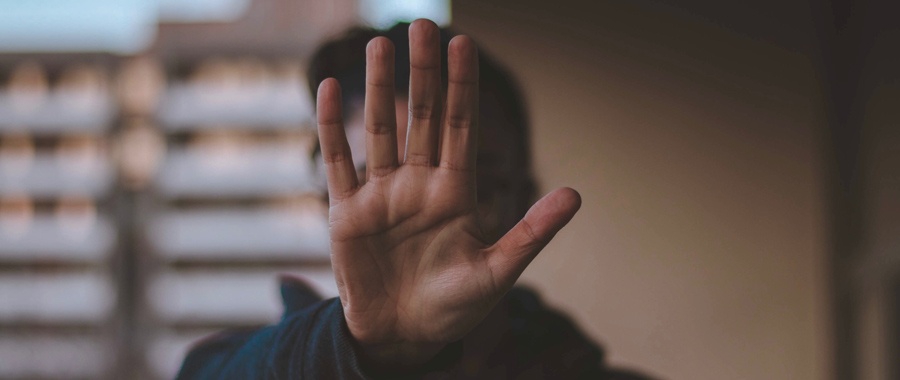


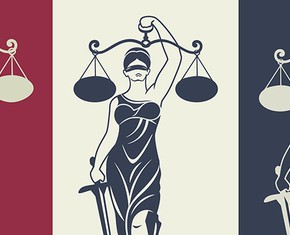




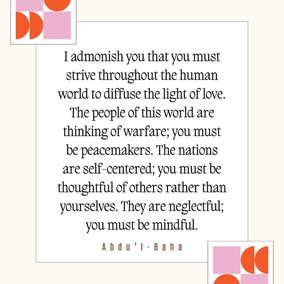
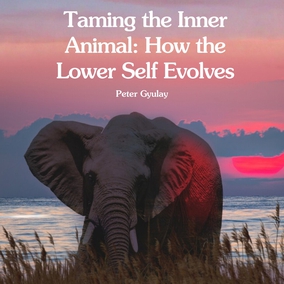
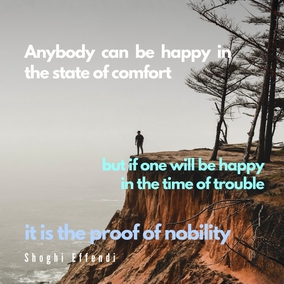
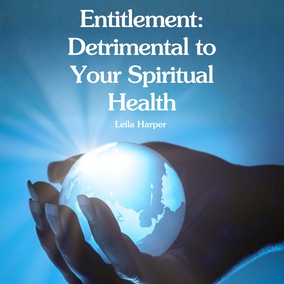
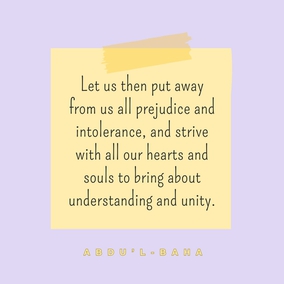

Comments
Sign in or create an account
Continue with Googleor